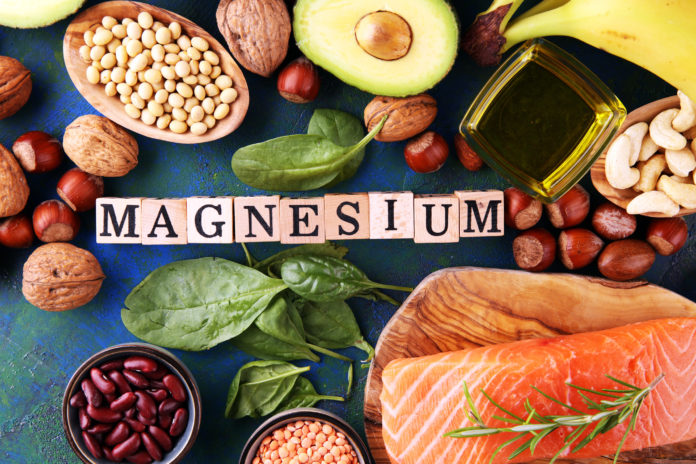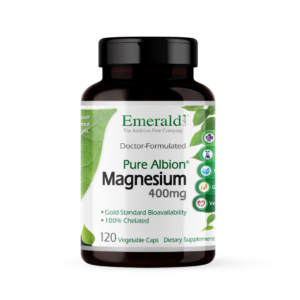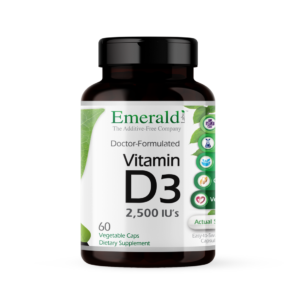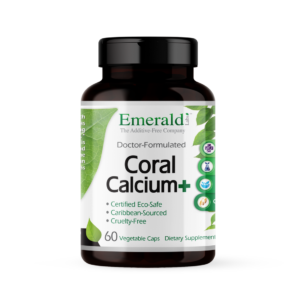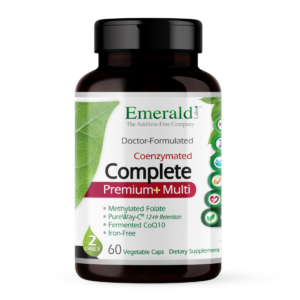About 50% of People Need More.
From energy production to detoxification, this powerhouse nutrient is responsible for over 300 enzyme reactions in the human body – including bone formation, muscle contraction, and DNA synthesis. The truth is, without this key nutrient, our body would cease to carry out many of its essential functions to survive. So what is it and how much do you really need?
This nutrient is known as Magnesium, and surprisingly about 50% of people have less than the recommended amount in their bodies that help support all of its amazing health benefits.
Common Causes of Deficiency
Most of the time we can attribute our lack in vitamins and minerals to our “not-so-healthy” modern diets which typically don’t contain enough quality nutrients to help support good health and protect against disease.
Below are some of the most common things that deplete magnesium from the body.
- Medications (e.g., PPI drugs for GERD; diuretics for high blood pressure)
- Depleted levels in crops
- Refined foods
- Overconsumption of alcohol and caffeine
- Malabsorption conditions (Crohn’s Disease)
- Excess calcium supplementation
- Diseases such as diabetes, kidney disease, liver disease
- High levels of physical activity
- High aluminum intake (cookware, medications, baking powder) depletes magnesium
- Pregnancy
What Are The Signs of Deficiency?

Understanding what depletes magnesium from our bodies is important for us to know so we can work on eliminating disruptive habits from our daily routines, but how do we know if we are actually deficient in this crucial mineral?
Here are some of the initial signs your body may be lacking in magnesium:
- Muscle Spasms
- Pins and Needles
- Fatigue and Weakness
- Shaking
- Nausea and Vomiting
- Loss of Appetite
- Hyper-excitability
- Sleepiness
- Abnormal Heart Rhythms
Getting Enough Magnesium
Research has shown that most Americans need an extra 300 mg of magnesium daily to manage the effects of chronic diseases. Good food sources include pumpkin seeds, chia seeds, almonds, spinach, black beans, and brown rice.
Depending on diet and other risk factors, our in-house doctor typically recommends people consume an extra 400 mg to 600 mg of magnesium daily, and has also helped formulate our own Emerald Labs Magnesium supplement. It contains therapeutic amounts of 100% Pure Albion® Magnesium as Glycinate Chelate, considered to be the Gold-Standard in quality minerals, for maximum bioavailability.*
Enter code "ENOUGH" in the order summary section at checkout to save an Extra 15% off your purchase.
What to Pair With Magnesium? (And how it improves the function of these supplements)
Vitamin D3
Vitamin D: Recent studies have shown that if a person is deficient in magnesium, no amount of Vitamin D3 supplementation will allow a patient to realize the health benefits of adequate Vitamin D. Magnesium is a critical factor in making Vitamin D bioavailable. Without magnesium present, Vitamin D is stored in the body and not used. Click here to add Vitamin D3 to your purchase.
Coral Calcium
Calcium: Magnesium helps bones develop and remain strong, as does calcium. Although your body does not need magnesium to absorb calcium, it does work alongside calcium to help regulate heartbeat and prevent calcium from getting into soft tissues and arteries where it could potentially be toxic. Click here to add Coral Calcium to your purchase.
Complete Premium Multi
Complete Multi: For a well-rounded approach to nutrition, the Complete Premium Multi contains essential vitamins and minerals including Albion® Chelated Minerals, Antioxidants such as Full-Spectrum Mixed Tocopherols, Tocotrienols & Carotenoids, Sunflower-based (Soy-Free) Vitamin E, PureWay-C® (12-Hour Retention), plus Coenzymated B’s and Methylated Folate.* Click here to add Complete Multi to your purchase.
Formulated by Dr. Mark Stengler NMD.
Known as America’s Natural Doctor to his patients, readers and audiences across North America, Mark Stengler is a licensed naturopathic medical doctor. His passion is to combine the best of conventional and natural medicine to achieve optimized health for his patients. Dr. Stengler has personally formulated each of the Emerald Labs Additive-Free products according to the high standards of his health practice. Read more about Dr. Stengler…
*These statements have not been evaluated by the Food and Drug Administration. This product is not intended to diagnose, treat, cure or prevent disease. CONSULT YOUR PHYSICIAN OR OTHER QUALIFIED HEALTH CARE PROVIDER FOR ADVICE REGARDING ANY MEDICAL CONDITION. DO NOT ATTEMPT TO SELF-DIAGNOSE OR TREAT ANY MEDICAL CONDITION.
†Selected References
DiNicolantonio JJ, O’Keefe JH, Wilson W. Subclinical magnesium deficiency: a principal driver of cardiovascular disease and a public health crisis [published correction appears in Open Heart. 2018 Apr 5;5(1):e000668corr1]. Open Heart. 2018;5(1):e000668. Published 2018 Jan 13. doi:10.1136/openhrt-2017-000668
Maier JA, Pickering G, Giacomoni E, Cazzaniga A, Pellegrino P. Headaches and Magnesium: Mechanisms, Bioavailability, Therapeutic Efficacy and Potential Advantage of Magnesium Pidolate. Nutrients. 2020;12(9):2660. Published 2020 Aug 31. doi:10.3390/nu12092660
Office of dietary supplements – magnesium. NIH Office of Dietary Supplements. https://ods.od.nih.gov/factsheets/Magnesium-HealthProfessional/. Accessed January 6, 2022.


